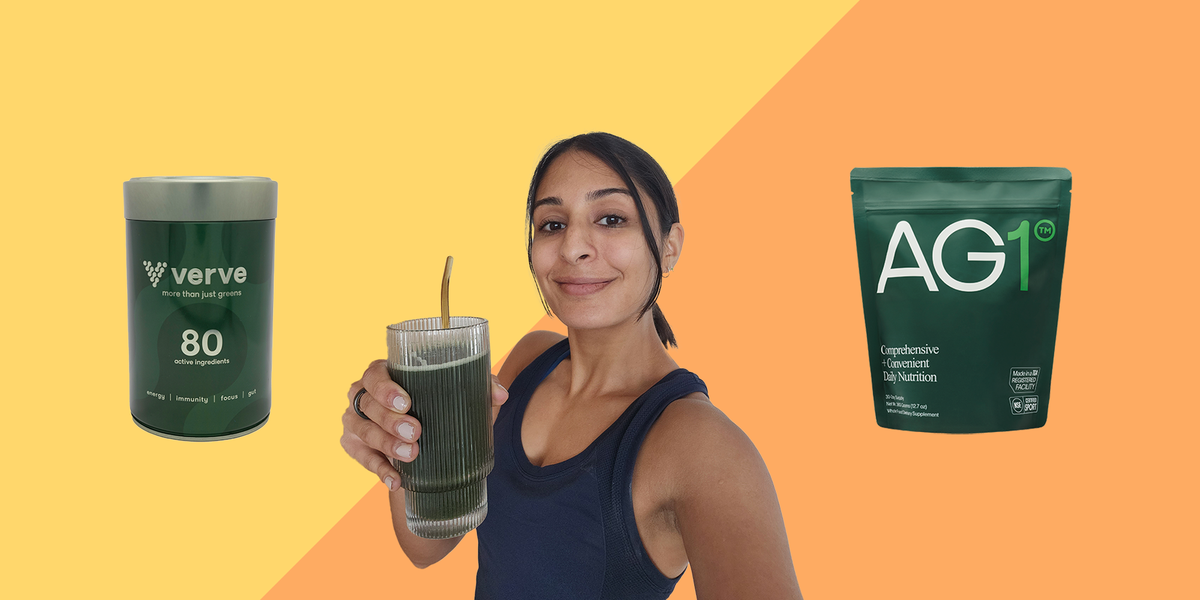What are greens powders?
Foulsham explains that greens powders are supplements typically made from dehydrated and powdered forms of leafy greens, algae, grasses and fruits. Many brands also add probiotics, digestive enzymes and herbs.
They shouldn’t be confused with green juices or smoothies, which are made from blended fresh fruit and vegetables.
“Many promise a quick and easy boost of vitamins, minerals, antioxidants and phytonutrients,” explains Foulsham. “They often provide vitamins A, C, K and folate in addition to minerals like iron, calcium and magnesium.”
Are greens powders good for you?
According to Foulsham, greens powders can be useful if you’re struggling to eat enough fresh fruit and veg daily. “If you’re someone who doesn’t have a balanced diet, it’s possible that the vitamins and minerals included in the powders can provide you with more nourishment than your diet,” she says.
She points out that there is limited evidence to suggest that taking greens powders is beneficial, noting that they don’t count towards your five-a-day. Additionally, if you’re already eating a healthy, balanced diet, it’s unlikely that a greens supplement will make much of a difference. This is because your body can only absorb a certain amount of vitamins – you’ll just wee out what your kidneys can’t handle.
That said, she believes there could be some psychological benefits. “While the evidence to support greens powders is limited, if taking one puts you in a ‘healthy’ mindset and encourages you to make other changes to better your health like moving more or prioritising sleep, then it can be helpful,” she says.
Greens powders vs. whole foods
One point to consider, says Foulsham, is that the vitamins and minerals in whole foods have better bioavailability than powders. That means they’re more easily absorbed by the body. “While greens powders do contain lots of micronutrients, there is little to no data to support the bioavailability of the micronutrients in this form, so we can’t be sure the body is making efficient use of them,” she explains.
Plus, whole foods provide us with more than just vitamins and minerals – they contain fibre, which is essential for maintaining a healthy digestive system. With greens powders, most of the fibre content is lost in the production process.
What should you look for in a greens powder?
If you do want to jump on the leafy bandwagon, Foulsham advises opting for a powder that contains real fruit and vegetables. “Aim for a product that has whole foods listed within the ingredients list and plenty of vitamins and minerals listed under the product NRVs (Nutrient Reference Values),” she says.
She suggests steering clear of supplements, which contain lots of synthetic and fortified ingredients. “Synthetic ingredients, especially sweeteners, can cause gastrointestinal distress, while fortified vitamins are ultimately no different to standard multivitamins, aside from the cost,” she explains.
As most greens powders are not regulated by governing bodies, there’s a chance that they don’t live up to their claims. So, it’s a good idea to choose one that’s been tested by a third party to check the ingredients list is accurate and free from contaminants. Verve’s powder, for instance, is Informed Sport Certified, while Athletic Greens is certified by the Cologne List and Informed Choice.
If you’re unsure or taking medication, it’s best to seek advice from a registered nutritionist or dietician before you take a green supplement.

